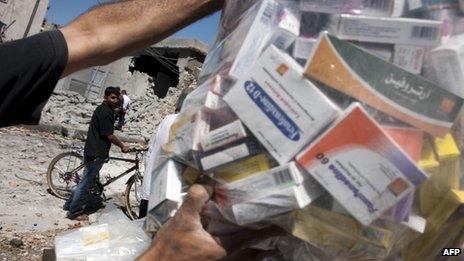Syria crisis leaves medicines in short supply
- Published

Bomb attacks and air strikes are the visible and immediate images associated with the conflict in Syria. But more subtle consequences, like the decimation of the pharmaceutical industry, are now being keenly felt.
More than 70% of pharmaceutical factories have had to shut because of the violence, estimates businessman Naji Ali-Adeeb. Hospitals, too, are closing down, with about 27 government hospitals now not functioning. Low-priced medicines are in short supply.
Mr Ali-Adeeb returned to Syria from the United States 20 years ago hoping to be part of the modernising of Syria. For much of the time, his pharmaceutical business was flourishing, but now it is foundering and his factory on the outskirts of Damascus is threatened with closure.
Many of his employees face daily dangers travelling to and from work, not only from the government shelling and clashes with the armed opposition, but also because of the rising risk of kidnapping.
"It is reaching a point of crisis. More than 70% of factories had to close down and the ones who are still working are operating with 25% of their capacity," he says.
Like most factories, which are typically located in the countryside surrounding Damascus and Aleppo, he has had to suspend his operations and is unsure about the fate of his plant after the area fell out of government control.
"It has been struggling for two years to stay alive and keep going despite very difficult conditions with sanctions which really affected the pharmaceutical industry," he says.
Supply chain
Syria produces 90% of its drugs itself. The sector is subsidised by the government, resulting in high quality and low prices. Products are also exported to the region.
But the majority of the sector's factories are in the northern city of Aleppo, which has been engulfed in fierce fighting since the summer of 2012. Regarded as the industrial capital, most of the factories in Aleppo have had to close down. Some other pharmaceutical factories are located in the suburbs of Homs and Damascus, which are also facing a lot of violence.
In one of Syria's government-supported hospitals, supplies are still available but there are some shortages.
Dr Anwar al-Eid of the Red Crescent Hospital in central Damascus says: "We have about 20 types of drugs unavailable here because of the economic sanctions and road accidents and from the violence."
Elsewhere in Syria, the situation is far worse, and other parts of the supply chain are also feeling the strain.
"There is no fuel, factories are closing down, workers cannot get to work. We are getting some shipments but not as it used to be and definitely not enough to meet the needs," says a chemist in central Damascus.
For now, chemists' shelves in Damascus are still full. But it's not clear how long supplies will last.
'Most dangerous jobs'
The government recognises the problem, and is reaching out for help. Elizabeth Hoff, of the World Health Organization, says the government has approached it.
"We are talking about essential medicines here which are life-saving," she says. "We are trying to see how we can supply this but we are also appealing to the humanitarian community for funding for this to make sure that we can get the medicine in."
Syria used to produce 90% of its own drugs but factories have closed because of the conflict, putting pressure on medical facilities
But there is a worsening crisis in areas controlled by the opposition.
Human Rights Watch says the Syrian authorities have denied wounded protesters access to medical assistance. Security forces have attacked makeshift hospitals and ambulances have been shot at.
One of the most dangerous jobs in Syria is delivering medicines to opposition-held areas. Reports say dozens of doctors have been detained and tortured for doing so.
At least one doctor, Ayham al-Gazzoul, was found dead after being detained for delivering medical aid to opposition areas. It's reported that many medics have fled the country, unwilling to work in dangerous circumstances or in situations where they are required to take sides.
The United Nations says it is supplying these areas, but shortages are getting worse, and the risk to medical workers remains severe.